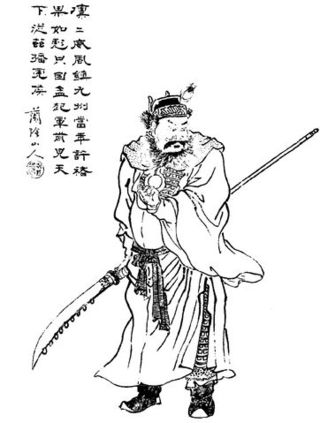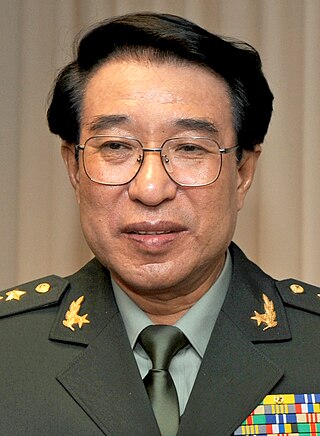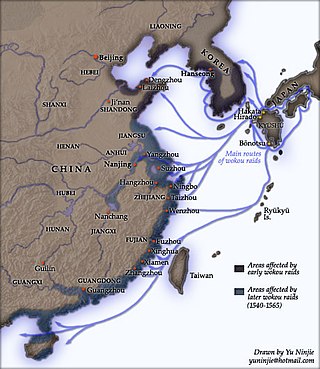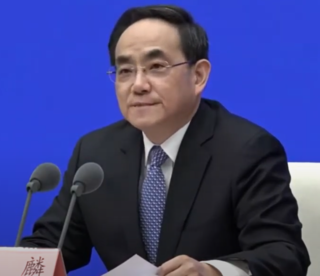Related Research Articles

Xu Huang, courtesy name Gongming, was a Chinese military general serving under the warlord Cao Cao in the late Eastern Han dynasty of China. He later served in the state of Cao Wei during the Three Kingdoms period under the first two rulers, Cao Pi and Cao Rui, before his death at the start of Cao Rui's reign. Xu Huang is best noted for breaking the siege at the Battle of Fancheng in 219 by routing the enemy commander Guan Yu on the field.

Xu Xiangqian was a Chinese Communist military leader and one of the ten marshals of the People's Liberation Army. He was the son of a wealthy landowner, but joined the Kuomintang's National Revolutionary Army, against his parents' wishes, in 1924. When the Kuomintang (KMT) began to fight the Communists (CCP) in 1927, Xu left Chiang's forces and joined the Eyuwan Soviet on the borders of Hubei, Henan, and Anhui. There he became commander of the Fourth Red Army under Eyuwan's leader Zhang Guotao. When the Fourth Red Army was defeated by a Kuomintang encirclement campaign, Zhang and Xu retreated to northern Sichuan. After Zhang defected to the KMT in the late 1930s, Xu survived politically and rejoined the Red Army, in a less senior position, under the leadership of Mao Zedong.

Xu Chu, courtesy name Zhongkang, was a Chinese military general who lived during the late Eastern Han dynasty and the Three Kingdoms period of China. He started his career as a bodyguard to the warlord Cao Cao and later became a general in the state of Wei during the Three Kingdoms period. He was described to be a big and strong man, yet simple minded and honest, so he was nicknamed "Tiger Fool" by his men. After his death, he was posthumously honoured with the title "Marquis Zhuang", which literally means "robust marquis".

Xu Caihou was a Chinese general in the People's Liberation Army (PLA) and vice-chairman of the Central Military Commission (CMC), the country's top military council. As Vice-chairman of the CMC, he was one of the top ranking officers of the People's Liberation Army. He also held a seat on the 25-member Politburo of the Chinese Communist Party between 2007 and 2012.

Xu Guangqi or Hsü Kuang-ch'i, also known by his baptismal name Paul, was a Chinese agronomist, astronomer, mathematician, politician, and writer during the Ming dynasty. Xu was appointed by the Chinese Emperor in 1629 to be the leader of the ShiXian calendar reform, which he embarked on with the assistance of Jesuits. Xu was a colleague and collaborator of the Italian Jesuits Matteo Ricci and Sabatino de Ursis and assisted their translation of several classic Western texts into Chinese, including part of Euclid's Elements. He was also the author of the Nong Zheng Quan Shu, a treatise on agriculture. He was one of the "Three Pillars of Chinese Catholicism"; the Roman Catholic Church considers him a Servant of God. On April 15, 2011, Vatican spokesman Federico Lombardi announced the beatification of Xu Guangqi.

The Legend of the White Snake is a Chinese legend centered around a romance between a man named Xu Xian and a female snake spirit named Bai Suzhen. It is counted as one of China's Four Great Folktales, the others being Lady Meng Jiang, Butterfly Lovers, and The Cowherd and the Weaver Girl.
Xu Jinglei is a Chinese actress and film director. She was hailed as one of the Four Dan Actresses in China. In 2002, Xu won the Huabiao Award for Outstanding New Actress for her performance in I Love You and the Hundred Flowers Award for Best Actress for Spring Subway. The same year, she won the Golden Rooster Award for Best Supporting Actress for her performance in Far From Home. In 2003, she won the directing debut award of the 23rd Golden Rooster Award for the first film she directed, My Father and I. In 2004, she won the Best Director Award at the 52nd San Sebastián International Film Festival for her film Letter from an Unknown Woman, which she composed, directed and starred in.

Shanghai Port Football Club, previously Shanghai SIPG, is a Chinese professional football club based in Shanghai, that competes in the Chinese Super League, the top tier of Chinese football. Shanghai Port plays its home matches at the Pudong Football Stadium, located within Pudong. Their owners are the Chinese group Shanghai International Port Group (SIPG).
A. indicus may refer to:

Xu Yifan, nicknamed Julie, is a Chinese professional tennis player who specializes in doubles. She reached a career-high ranking of No. 148 in singles, on 13 July 2015. On 13 January 2020, she peaked at No. 7 in the WTA doubles rankings.

Xu Chen is a badminton player from China. In 2010, he was ranked within the top 10 men's badminton doubles in the world. At the 2012 Summer Olympics, he competed in the mixed doubles with Ma Jin, winning the silver medal. In the final they lost to Zhang Nan and Zhao Yunlei, also from China. He married a former Chinese national badminton team player, Pan Pan on 3 June 2014.

Xu Shilin is a Chinese tennis player.

The Jiajing wokou raids caused extensive damage to the coast of China in the 16th century, during the reign of the Jiajing Emperor in the Ming dynasty. The term "wokou" originally referred to Japanese pirates who crossed the sea and raided Korea and China; however, by the mid-Ming, the wokou consisted of multinational crewmen that included the Japanese and the Portuguese, but a great majority of them were Chinese instead. Mid-Ming wokou activity began to pose a serious problem in the 1540s, reached its peak in 1555, and subsided by 1567, with the extent of the destruction spreading across the coastal regions of Jiangnan, Zhejiang, Fujian, and Guangdong.

Xu Xin is a Chinese professional table tennis player who is currently ranked world No. 103 as of May 2023 for men's singles by the International Table Tennis Federation (ITTF). He first reached his career-high singles ranking of world No. 1 in January 2013.

Xu Lin is a Chinese politician, who is currently serving as the Communist Party secretary of Guizhou. Previously he served as director of the State Council Information Office and director of the National Radio and Television Administration. He also served as the main official in charge of internet policy, the head of the Cyberspace Administration of China, from June 2016 to July 2018. Xu was previously the head of the Shanghai propaganda department and later Chinese Communist Party Committee Secretary of Pudong.

Xu is a Chinese-language surname. In the Wade-Giles system of romanization, it is spelled as "Hsu", which is commonly used in Taiwan. It is different from Xu, represented by a different character.

Xu is a Chinese-language surname. In the Wade-Giles system of romanization, it is romanized as "Hsu", which is commonly used in Taiwan. It is different from Xu, which is represented by a different character.
Altericroceibacterium indicum is a gram-negative, rod-shaped and non-spore-forming bacterium from the genus Altericroceibacterium which has been isolated from the rhizosphere from the rice plant Porteresia coarctata in Pichavaram in India.
Altericroceibacterium endophyticum is a Gram-negative, rod-shaped and motile bacterium from the genus Altericroceibacterium which has been isolated from the plant Halimione portulacoides.

Tony Xu is a Chinese-American billionaire businessman and the co-founder and chief executive officer (CEO) of DoorDash. Born in Nanjing, China, Xu immigrated to the United States with his parents at the age of four. He earned degrees from the University of California, Berkeley and Stanford University's Graduate School of Business. Earlier in his career, Xu interned at Square, Inc., and worked for McKinsey & Company, eBay, and PayPal. He was included in Fortune's "40 Under 40" list in 2020.
References
- 1 2 3 Xu, Lin; Sun, Cong; Fang, Chen; Oren, Aharon; Xu, Xue-Wei (2020). "Genomic-based taxonomic classification of the family Erythrobacteraceae". International Journal of Systematic and Evolutionary Microbiology. 70 (8): 4470–4495. doi:10.1099/ijsem.0.004293. PMC 7660246 . PMID 32726199.
- ↑ Euzéby, Jean P.; Parte, Aidan C. "Altericroceibacterium". List of Prokaryotic names with Standing in Nomenclature (LPSN). Retrieved 5 June 2021.